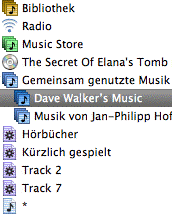Afterthoughts on iTunes 4¶
893 words on iTunes
Of course I have a few additions to make on yesterday's iTunes 4 post. I don't really like 'adding' things in this way as it makes inconvenient reading. It's a little blogging dilemma I guess: On the one hand editing my old post feels like cheating while on the other hand I feel like I'll have to write on a topic like iTunes 4 while it's still 'hot'. Writing on it in a few days' time seems pretty redundant: While my observations may be interesting or even original today, they're bound to be replaceable by linking to other people tomorrow. So if I want to rant about this I'd rather do it asap as it'll be a waste of time tomorrow. It's a bit silly, but so it goes...
Library Sharing:
 Having the opportunity to use both Rendezvous-based and manually connected playlist sharing with Jan-Philipp and Dave today, I made good use of it and gained some more experience. But before that, marvel the pretty looks of iTunes' 'Sources' section with all those icons. The only thing missing is an iPod to make it complete – even more iPod envy coming up.
Having the opportunity to use both Rendezvous-based and manually connected playlist sharing with Jan-Philipp and Dave today, I made good use of it and gained some more experience. But before that, marvel the pretty looks of iTunes' 'Sources' section with all those icons. The only thing missing is an iPod to make it complete – even more iPod envy coming up.
Back to library sharing: My first observation is the obvious fact that it eats up a fair share of bandwidth. At least German DSL connections apparently don't give you more than 128KBit/s upstream, meaning people having that kind of connection can't use it across the internet. But even with a fast connection, you accumulate data throughput rather quickly – which may been an issue if you pay by GB or have similar limitations.
Also, iTunes' caches could be a little more generous. I often experienced a couple of seconds of silence, particularly at the beginning of songs: The song actually starts fine but after a few seconds it has to re-buffer stuff for some reason. But that's only for internet connections which are probably a bit more shaky.
I suppose library sharing is mainly aimed for your local in-house convenience anyway. The across-internet ability isn't really advertised and there might be good reasons for that. What I'm a bit concerned about is the authorisation and privacy bit. I don't want to exhibit my iTunes library to just anyone on the internet. And I guess other don't want to do that either, be it for bandwidth concerns or privacy issues. Thus, I suppose we'll see quite a few people whose computers are accessible from any other computer on the internet use a password to protect their library. This in turn makes it inconvenient to for people on your local network to access your library as they'll have to enter the password every time. So I'm hoping for keychain support there.
Having 'Bookmarks' for other people's libraries would be overkill, I think. Almost as silly as QuickTime Player's Bookmarks section. And those few people who want to bookmark their friends' libraries, can still do so. Either by dragging a daap:// URL to the Finder and double-clicking it there or, even more integrated, by quickly making an AppleScript à la
tell app "iTunes" open location "daap://your.address.here" end telland storing it in ~/Library/iTunes/Scripts/ along with the other iTunes AppleScripts (not yet updated).
Similarly you may not want to share all of your library, say because you don't want me to see the 'Sven's Birthday Surprise Mix' playlist (although I don't consider this a huge problem). If you think you have something to hide, don't turn on library sharing, just as for any other kind of sharing.
Sceptical: Nice to see that my partial scepticism vis-à-vis the music store are shared. I quite like holding CDs and LPs – not as much as listening to them, but it's still an important bit of relating to them. Probably this is among the reasons why iTunes had to have the ability to store and display album covers with the songs now. It's not only pretty but also very useful to recognise the albums.
I particularly agree with seeing a danger in making the purchase of music that easy. Parents will be forced to be very careful with their music player in the future. Also, iTunes seems to support that one-click thing. A technology that I've always considered particularly evil. You should always have the 'checkout' situation when spending money. Things might go out of hand otherwise.
On the other hand, all the music store business doesn't affect your normal use of iTunes. You can even remove its icon from iTunes easily. So nothing is forced on us. John Gruber puts this nicely:
The fact is, there’s nothing in iTunes 4 that prevents you from listening to digital music the same way you did before the iTunes Music Store – you can still encode your own music in MP3 format, and you can still play bootleg MP3 files. The iTunes Music Store is something more, not something else.
And the general reactions concerning the store and iTunes seem to be positive or at least neutral or ... – even in places where the word 'Apple' regularly causes bitch-fests. And assuming that Apple 'got it right' yet again, the rest of the industry can – and most probably will – follow now. It's probably not a revolution work from a technical point of view, but someone has to do it. First.
